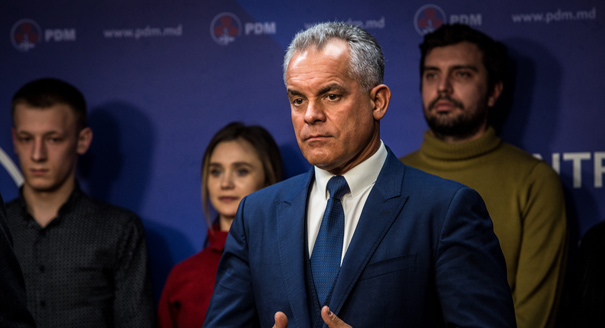As in much of Eastern Europe, politics in Moldova has come to be seen through the clichéd prism of a deadly struggle between pro-Russian and pro-Western forces. The election on November 13 as president of Moldova of Igor Dodon, a candidate professing sympathy for Moscow, over the pro-European Maia Sandu fits this model nicely. But it ignores some local realities that tell a rather different story.
At first glance, the Dodon-Sandu contest seems to perfectly illustrate a clash between East and West in Moldova. Dodon is both a socialist and an Orthodox believer. He regularly visits Moscow, does not hide his affection for President Vladimir Putin, expresses support for Putin’s Eurasian integration projects, describes Crimea as “Russian,” criticizes the European Union, and professes support for traditional family values.
By contrast, Sandu, the defeated candidate, studied at Harvard, worked at the World Bank in Washington, and served in several pro-European administrations in Chisinau. During the election campaign, she received the endorsement of European politicians, including Angela Merkel, Donald Tusk, and Jean-Claude Juncker.
The presidency in Moldova is a largely ceremonial post, and the current government is still nominally pro-European. But the Kremlin could afford to celebrate when Dodon was declared the winner with 52.2 percent of the vote to the 47.8 percent achieved by Sandu.
All of this, however, ignores Moldova’s recent history and in particular the scandal of the “one billion dollar theft” that rocked the country in 2015. Throughout the whole of last year and the first half of 2016, the small, poor republic was shaken by anti-government protests in which tens of thousands of angered citizens took to the streets. The catalyst for the protests was that $1 billion had been syphoned out of three Moldovan banks, seemingly with the connivance of high-level officials.
An apparent paradox of the protests was that people flew European Union flags while demanding the resignation of a pro-European government. But a broad coalition of forces supported the protests, including both the pro-Russian Dodon and the pro-European Sandu.
Throughout its post-independence history, Moldova has fractured on East-West lines, so this union of different forces was unprecedented. Opposition politicians of different allegiances put away their party flags and selected white chrysanthemums as the neutral symbol of the protests.
They were united by an anti-corruption agenda and by a common enemy—the oligarch, Deputy Chairman of the ruling Democratic party Vladimir Plahotniuc. Despite not holding the highest office, Plahotniuc was well known to control the government, the parliament, and the largest media conglomerate in the country.
Moldova’s Constitutional Court had frequently made rulings in Plahotniuc’s favor, and on March 4 this court put an end to the short-lived protest movement. One Friday evening, it decided to repeal the amendment to the Moldovan constitution, enacted in 2000, under which the head of state, the president, has limited powers and is elected by parliament. As the current president, Nicolae Timofti, was set to leave office in March, the court effectively fired the starting gun for the next presidential election.
The ruling shook up the domestic status quo. The opposition happily agreed to play the game of presidential elections and abandoned the city’s squares in favor of an electoral campaign. Different opposition candidates vied with one another, and the common front forged in the protests fell apart. Politicians who were previously united in their demand for the resignation of the government and the prosecution of Plahotniuc turned against each other.
In an acrimonious campaign, Sandu supporters spread rumors that Russian tanks would appear in Moldova if Dodon were elected. In return, the socialist’s devotees told people about Sandu’s connection to the LGBT community and about the tens of thousands of Syrian refugees she was supposedly planning to let into the country as part of a deal she had allegedly reached with Merkel.
Plahotniuc was almost certainly the only person who applauded the vicious tone of the election. Each side left him alone, while occasionally alleging that their opponents were in cahoots with a toxic oligarch. Plahotniuc was so confident that he took his candidate—the leader of the Democratic Party, Marian Lupu—off the ballot. It was a small sacrifice, given the fact that the president of Moldova has so few powers under the revised constitution that he can’t actually influence the decisionmaking process, including in foreign policy.
The new head of state will still be the main foreign face of Moldova. He can engage in noisy fights with the government and the parliament, defer signing laws, and meet with Vladimir Putin. This should suit Plahotniuc well, as Brussels and Washington will be forced to work even more closely with the oligarch who still professes a pro-European vision for Moldova, or, to put it more crudely, the role of “he’s a son of a bitch, but he’s our son of a bitch.” This status quo will persist for another two years at least, until the 2018 parliamentary elections, which are much more important for the future of the country.
Preparations for the next parliamentary election will take place in an extremely polarized society. The almost equal split between Dodon and Sandu, with their instinctive orientation toward Moscow and Brussels, confirms again Moldova’s divided political identity. It was this all-consuming fight between the two political camps, interrupted only briefly in 2015, that diverted the attention of the public from the looming corruption scandal and made possible the theft of billions and the practical usurpation of power by a man whom nobody had elected.
